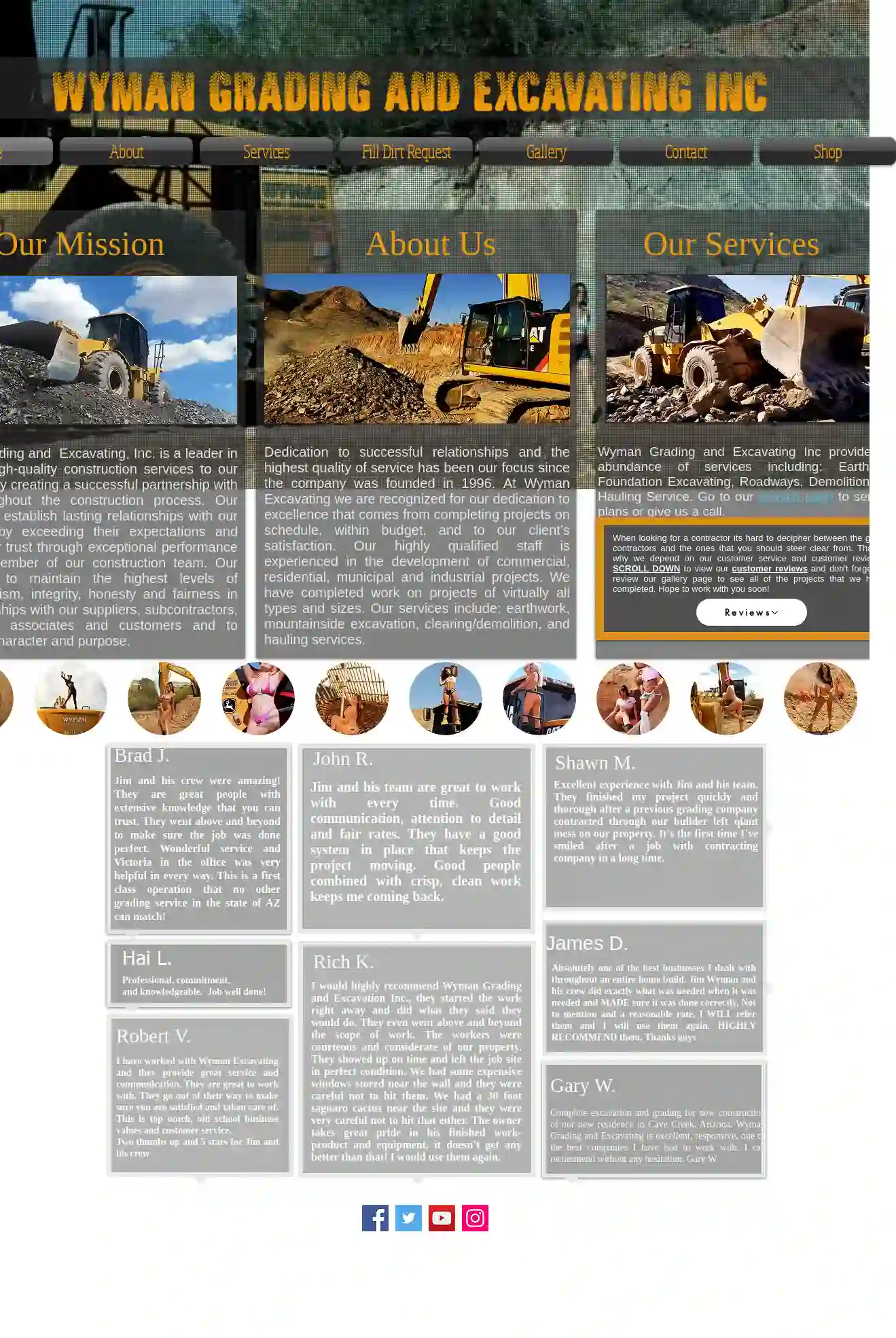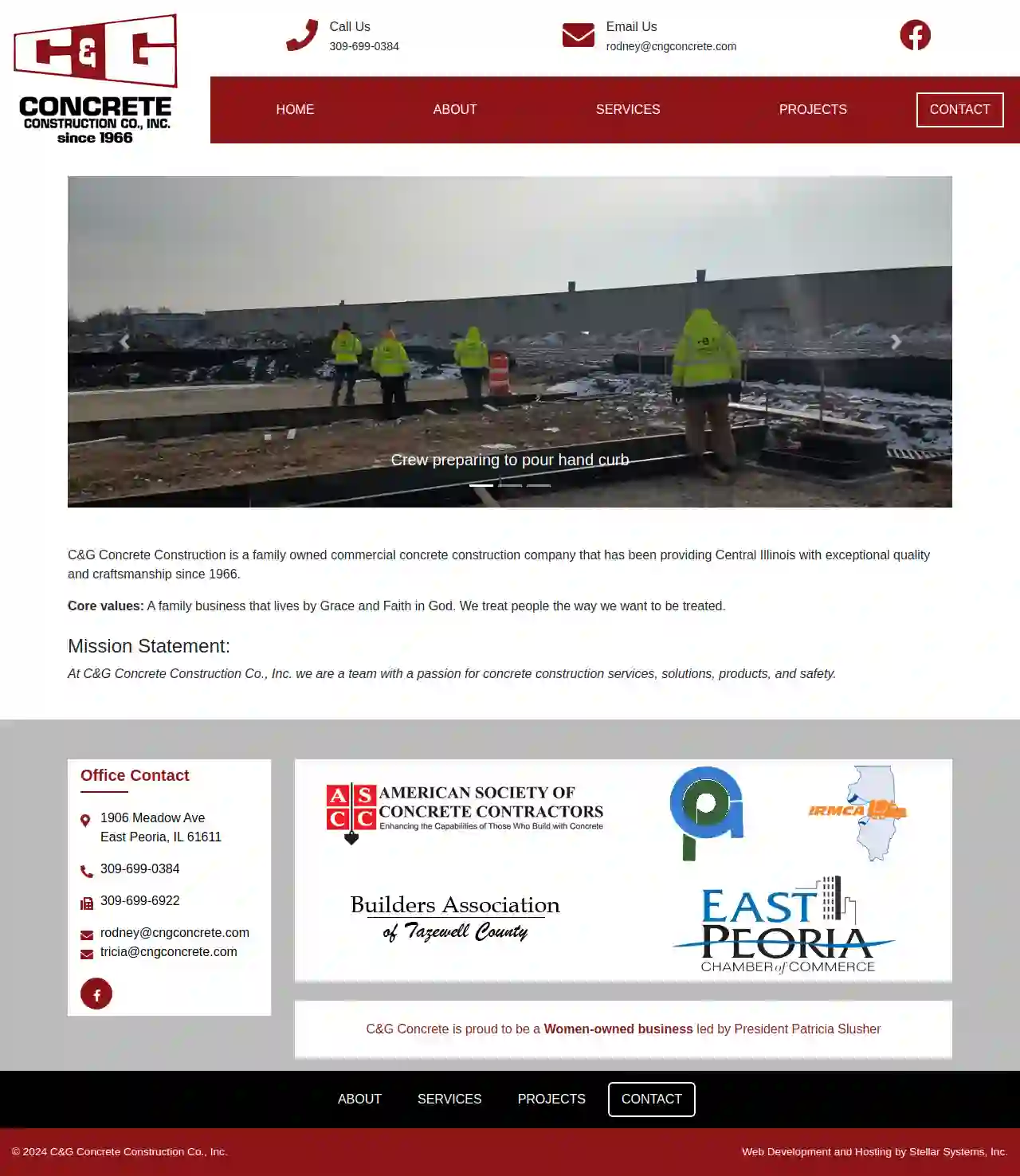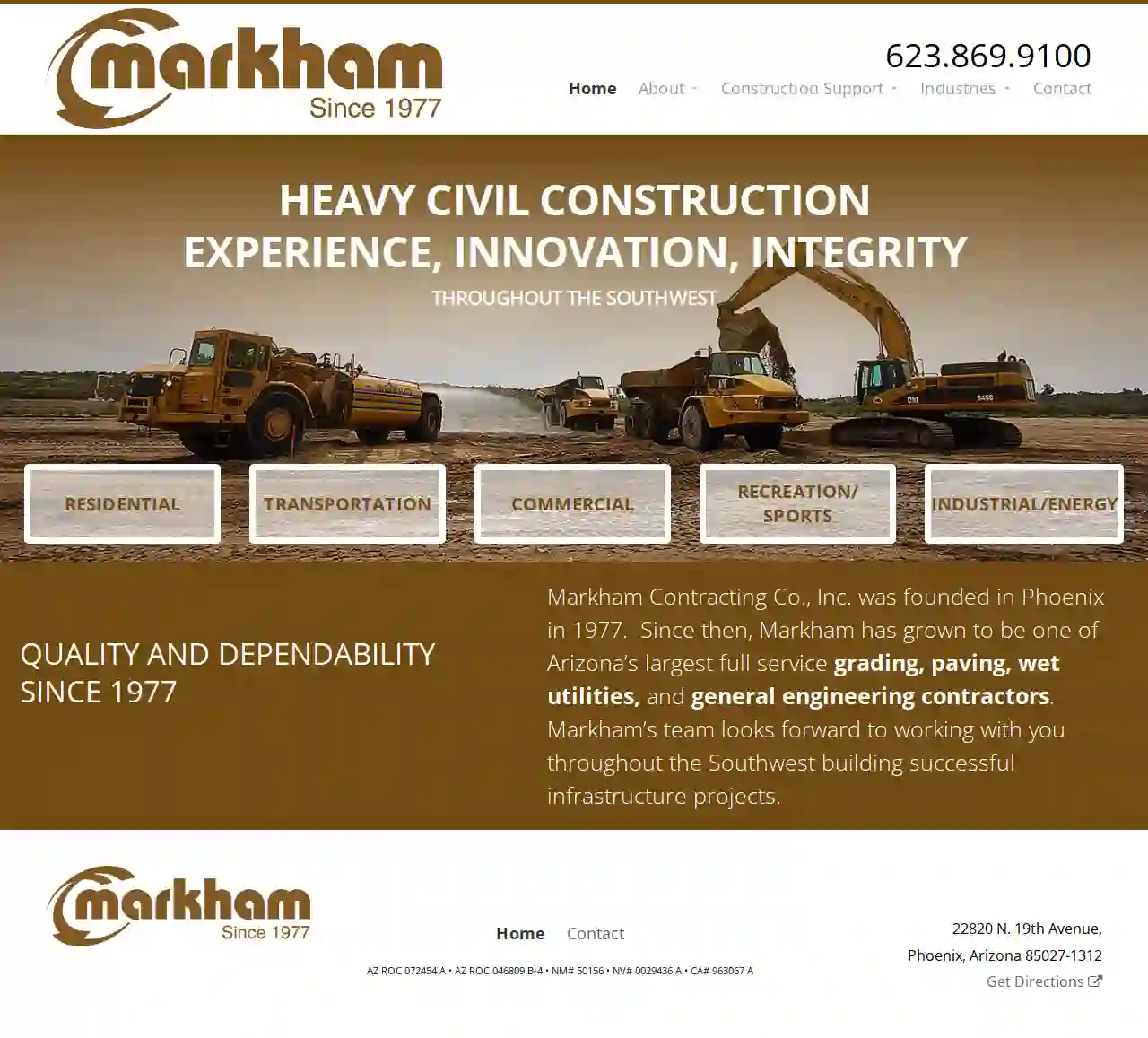Excavation Contractors Yuma
Top 10 Trenching Services in Yuma
Receive 3 FREE Land Excavation quotes for your project today! Compare profiles, reviews, accreditations, portfolio, etc... and choose the best deal.

Kimble Landscaping & Excavating Inc
2.910 reviews22811 Hardscrabble Rd., Sparland, 61565, USWITH KIMBLE EXCAVATING, THERE'S NO JOB TOO BIG OR TOO SMALL Call us today to get started on your next project. A FEW OF OUR PROJECTS FOUNDATION REPAIR Your building may need an inspection if you notice water logging at the foundation instead of it flowing away from your home. Oftentimes, water will get trapped within the foundation, freeze, and then cause the foundation to crack. View more EXCAVATING From grading and finish seeding to ponds and creek crossings, we offer a wide variety of excavating services to meet your needs. View more CONCRETE & ROCK We can handle any concrete and rock installations or repairs for residential and agricultural settings. View more SERVING THE FOLLOWING COMMUNITIES FOR OVER 40 YEARS: Peoria, Dunlap, Washington, East Peoria, Germantown Hills, Princeville, Hanna City, Spring Bay, Chillicothe, Bartonville, Sparland, Lacon, Henry
- Services
- Why Us?
- Gallery
Get Quote
Vickers Landscape LLC
52 reviewsPhoenix, USVICKERS LANDSCAPE Servicing Arizona since 1999 LANDSCAPE ARCHITECTURE Licensed, Bonded & Insured RESIDENTIAL & COMMERCIAL SERVICE Affordable Landscaping
- Services
- Why Us?
- Gallery
Get Quote
Goodwillie Earthwerks
52 reviewsTucson, USOver 2 Decades of Excavation Experience Goodwillie Earthwerks has nearly two decades of experience in excavation, demolition, clearing and hauling. We offer a wide array of services from basic grading and drainage solutions to utility infrastructure design and install. At Goodwillie Earthwerks, we take great pride in our reputation in quality work and highly satisfied customers. Why Choose Our Excavating Contractor? We gladly go the extra mile to ensure your 100% satisfaction! Goodwillie Earthwerks, Inc is a locally owned and operated excavating company in Tucson, AZ. We are your top choice for excavating contractors! If you're looking for a professional excavating contractor in the Oro Valley and Tucson, AZ area who specializes in excavation needs and services, look no further than Goodwillie Earthwerks. Our excavating company can handle everything for you! We've been providing long-term care and attention to detail when you need work done on your commercial property for many years. We strive to provide quality and professional workmanship at competitive prices for all types of excavation work. You can rely on our team of experienced excavating professionals to be there for you from the first consultation to the big reveal! Goodwillie Earthwerks is a group of highly trained excavating professionals who pay attention to the smallest details and strive for excellence. Using our services can improve the appearance of your commercial or residential property and increase its value. Your commercial and residential properties will look great when you choose to work with Goodwillie Earthwerks's excavating contractor! When you give us a call, you will be connected directly to our owner, so you can expect immediate attention to your inquiry. So, don’t wait. Call us today!
- Services
- Why Us?
- Testimonials
- Gallery
Get Quote
A&E Excavation
51 reviews216 Dishman Lane, Bowling Green, 42101, USFrom The Ground Up A&E Excavation and A&E Trucking offers an extensive range of services encompassing all facets, from excavating footers to providing topsoil, ensuring the project's successful conclusion. Who We Are A&E Trucking and Excavation, a company based in Bowling Green, KY, prides itself on being both owned and operated by Veterans. Our commitment lies in executing every task with the utmost professionalism. We eagerly anticipate the opportunity to assist you in bringing your commercial and industrial projects to fruition. Reach out to us today for further information. Excavation Pros at setting up building pads, parking lots, footings, utilities, septic systems, and leveling the playing field! Trucking We offer a range of materials including topsoil, fill dirt, and various types of stone. Additionally, the company specializes in custom hauling and haul-off services. Pride In Our Community Our core objective revolves around supporting businesses in actualizing their commercial and industrial ventures. Our organization is dedicated to delivering vital services to our growing community. We are enthusiastic about furthering our involvement as our community flourishes. From Site Prep To Topsoil We possess the expertise to manage projects of various scales. Whether you are at the inception or culmination of your project, our support remains unwavering. Initiate contact with us to explore how we can contribute to realizing your project aspirations. Commercial & Industrial Ensuring your satisfaction with the level of professionalism maintained at each job site is of utmost importance. Contact us for a free consultation. Multi-Residential Site Prep Initiate your subdivision project successfully by leveraging the expertise of A&E professionals. Contact us today! Commercial Site Prep A&E is proficient in preparing construction sites to facilitate seamless operations. Topsoil If your project requires topsoil, please reach out to A&E Trucking to arrange for a prompt delivery. Contact us! Stone Stone for your upcoming project? Our supply encompasses a diverse array of stone types. Commercial & Industrials Let's Create Something Great We approach every project with confidence and enthusiasm, ready to collaborate with each and every customer. Our primary objective is to provide exceptional service, regardless of the scale of the project. Engage us in your upcoming development; we are eager to combine efforts and create remarkable outcomes together. Let us embark on this exciting journey side by side! Backfill and Recompacting We specialize in precise backfilling, ensuring proper compaction from start to finish. A&E Excavating is renowned for its unmatched industry expertise and a vast clientele who are consistently satisfied, positioning us as a reputable leader in grading, excavation, recompacting, and similar services.
- Services
- Why Us?
- Gallery
Get Quote
Wyman Grading and Excavating Inc.
3.511 reviewsPhoenix, USOur Mission Wyman Grading and Excavating, Inc. is a leader in providing high-quality construction services to our customers by creating a successful partnership with them throughout the construction process. Our pledge is to establish lasting relationships with our customers by exceeding their expectations and gaining their trust through exceptional performance by every member of our construction team. Our mission is to maintain the highest levels of professionalism, integrity, honesty and fairness in our relationships with our suppliers, subcontractors, professional associates and customers and to serve with character and purpose. About Us Dedication to successful relationships and the highest quality of service has been our focus since the company was founded in 1996. At Wyman Excavating we are recognized for our dedication to excellence that comes from completing projects on schedule, within budget, and to our client’s satisfaction. Our highly qualified staff is experienced in the development of commercial, residential, municipal and industrial projects. We have completed work on projects of virtually all types and sizes. Our services include: earthwork, mountainside excavation, clearing/demolition, and hauling services.
- Services
- Why Us?
- Testimonials
- Gallery
Get Quote- Co
Cobb's Construction And Excavation
51 reviewsPhoenix, US- Services
- Why Us?
- Gallery
Get Quote 
Art barber Excavating
4.312 reviews3370 W. Sabin Brown Road, Suite A, 3370 W. Sabin Brown Road Suite A, Wickenburg, 85390, USArt Barber Excavating Art Barber Excavating And Decorative Rock. Art Barber Excavating, a family-owned and operated business since 1981, is located in Wickenburg, Arizona. We specialize in providing a wide range of excavating services and decorative rock delivery. Our commitment to customer satisfaction is evident in our dedication to treating every customer like family. We offer a comprehensive selection of landscaping products and excavating services to meet your residential or commercial needs. Our services include: Site excavation Grading Septic tank installation Brush removal Demolition Driveway grading Decorative rock delivery Arena sand delivery Mulch delivery Screened fill dirt delivery Unscreened fill dirt delivery We are proud to have built a strong reputation as the leading excavating contracting company in our area. Our team of experienced professionals is dedicated to providing high-quality services that meet your specific needs and exceed your expectations.
- Services
- Why Us?
- Gallery
Get Quote
C & G Concrete Construction Co., Inc.
53 reviews1906 Meadow Ave, East Peoria, 61611, USC&G Concrete Construction Co., Inc. is a family-owned commercial concrete construction company that has been serving Central Illinois with exceptional quality and craftsmanship since 1966. Core Values: We are a family business that lives by Grace and Faith in God. We treat people the way we want to be treated. Mission Statement: At C&G Concrete Construction Co., Inc. we are a team with a passion for concrete construction services, solutions, products, and safety.
- Services
- Why Us?
- Our Team
- Gallery
Get Quote
BedRock Siteworks LLC
4.511 reviewsPhoenix, USAbout BedRock Siteworks Established in 2003 in Chester County, PA, BedRock Siteworks provides a comprehensive range of services for your excavation needs. We specialize in shed pads, foundations, driveways, retaining walls, and drainage and erosion solutions. Our commitment to delivering quality service is unwavering, and we strive to exceed your expectations on every project. Our Mission At BedRock Siteworks, we believe in building better, not settling for less. We are dedicated to providing our clients with the highest quality workmanship and exceptional customer service. We take pride in our attention to detail and our ability to deliver projects on time and within budget. Our Team Our team of experienced professionals is committed to providing you with the best possible service. We are dedicated to understanding your needs and working with you to achieve your goals. We are proud of our reputation for quality and reliability, and we are committed to providing our clients with the best possible experience.
- Services
- Why Us?
- Testimonials
- Gallery
Get Quote
Markham Contracting Co., Inc
4.467 reviews22820 N. 19th Avenue, Phoenix, 85027-1312, USExperience, Innovation, Integrity Throughout the Southwest QUALITY AND DEPENDABILITY SINCE 1977 Markham Contracting Co., Inc. was founded in Phoenix in 1977. Since then, Markham has grown to be one of Arizona’s largest full service grading, paving, wet utilities, and general engineering contractors. Markham’s team looks forward to working with you throughout the Southwest building successful infrastructure projects.
- Services
- Why Us?
- Gallery
Get Quote
Over 3,943+ Excavation Contractors onboarded
Our excavation experts operate in Yuma & beyond!
ExcavationHQ has curated and vetted the Best Excavation Businesses near Yuma. Find a trustworthy contractor today.
Frequently Asked Questions About Excavation Contractors
- Sloped Property: Your property has a significant slope, making it prone to soil erosion or landslides.
- Creating Usable Space: You want to level off a sloped area to create a flat surface for patios, gardens, or other outdoor spaces.
- Preventing Damage: Erosion is threatening existing structures, driveways, or walkways.
- Landscaping Features: You're incorporating tiered gardens, raised beds, or other landscaping elements requiring soil retention.
- Utility Locates: Contact your utility companies to mark the locations of underground lines before excavation begins. This is usually a free service.
- Hand Digging: Excavate carefully by hand near marked utility lines to avoid damage.
- Potholing: Digging small test holes to expose and verify utility depths and locations.
- Safe Distances: Maintaining a safe distance between excavation equipment and marked utility lines.
- Vacuum Excavation: Using vacuum excavation techniques to expose utilities without digging, reducing the risk of damage.
- Hauling to Designated Disposal Sites: Transporting excavated material to approved landfills or recycling centers.
- Recycling or Reuse: If suitable, some excavated soil might be recycled for other projects or reused on-site for landscaping or backfilling.
- Complying with Regulations: Adhering to local and environmental regulations for soil disposal to prevent contamination or illegal dumping.
- Excavations Deeper Than a Certain Depth: This varies by jurisdiction, usually around 5 feet.
- Excavations Near Utilities: Digging near buried utilities (gas, water, electric) often requires permits and utility locates to prevent damage.
- Excavations Affecting Public Property: Projects impacting sidewalks, roads, or other public areas typically require permits.
- Excavations in Environmentally Sensitive Areas: Projects in wetlands, floodplains, or other sensitive areas might need special permits.
How do I know if I need a retaining wall?
How do you protect utilities during excavation?
How do you handle soil disposal after excavation?
Do I need a permit for excavation?
How do I know if I need a retaining wall?
- Sloped Property: Your property has a significant slope, making it prone to soil erosion or landslides.
- Creating Usable Space: You want to level off a sloped area to create a flat surface for patios, gardens, or other outdoor spaces.
- Preventing Damage: Erosion is threatening existing structures, driveways, or walkways.
- Landscaping Features: You're incorporating tiered gardens, raised beds, or other landscaping elements requiring soil retention.
How do you protect utilities during excavation?
- Utility Locates: Contact your utility companies to mark the locations of underground lines before excavation begins. This is usually a free service.
- Hand Digging: Excavate carefully by hand near marked utility lines to avoid damage.
- Potholing: Digging small test holes to expose and verify utility depths and locations.
- Safe Distances: Maintaining a safe distance between excavation equipment and marked utility lines.
- Vacuum Excavation: Using vacuum excavation techniques to expose utilities without digging, reducing the risk of damage.
How do you handle soil disposal after excavation?
- Hauling to Designated Disposal Sites: Transporting excavated material to approved landfills or recycling centers.
- Recycling or Reuse: If suitable, some excavated soil might be recycled for other projects or reused on-site for landscaping or backfilling.
- Complying with Regulations: Adhering to local and environmental regulations for soil disposal to prevent contamination or illegal dumping.
Do I need a permit for excavation?
- Excavations Deeper Than a Certain Depth: This varies by jurisdiction, usually around 5 feet.
- Excavations Near Utilities: Digging near buried utilities (gas, water, electric) often requires permits and utility locates to prevent damage.
- Excavations Affecting Public Property: Projects impacting sidewalks, roads, or other public areas typically require permits.
- Excavations in Environmentally Sensitive Areas: Projects in wetlands, floodplains, or other sensitive areas might need special permits.